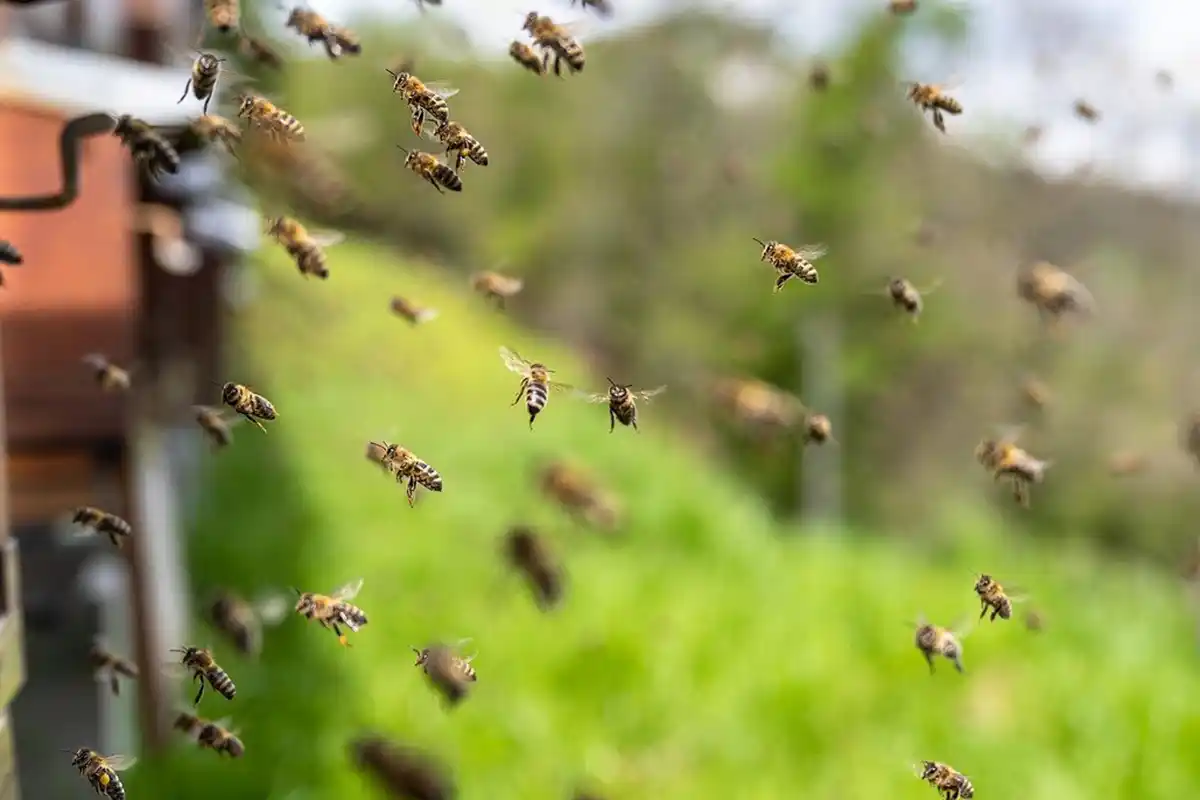
Why Do Bees Get Aggressive?
A customer asked me the other day, why bees get aggressive. As I explained the reasons for this, it made me think about writing an article in our blog about it. I figure, many people could benefit from better understanding under what circumstances Nature’s most prolific pollinator, can become aggressive.
First, it’s important to realize that bees play an essential role in our ecosystem as they are pollinators for an extensive range of plants, including many crops vital for human consumption. However, the image of bees isn’t always one of benign productivity. That’s because some of us are afraid that these tiny creatures can sting us as a result of their potential for aggression. So, what exactly makes bees aggressive, and is there a rationale behind this behavior?
The Nature of Aggression in Bees
Aggression among bees can be understood as a natural defense mechanism rather than a sign of malevolence or randomness. There are several key factors that influence aggressive behavior in bees:
Colony Defense
Bees, particularly honeybees and some species of bumblebees, are highly social insects that live in colonies. Their primary instinct is to protect the hive and its queen. When an intruder threatens the colony, be it a predator or a perceived danger, bees instinctively respond aggressively to defend their home. This behavior is especially pronounced during the spring and summer months when colonies are most active and the queen is producing more brood.
Pheromones as Signals
Bees communicate with each other using chemical signals known as pheromones. When a bee feels threatened, it releases alarm pheromones that can incite aggression amongst fellow colony members. This creates a rapid response where other bees quickly join in the defense, often leading to a collective attack on the perceived threat.
Species Differences
Not all bee species are equally aggressive. For example, honeybees tend to be more defensive than others, like many solitary bee species, which are more likely to flee than fight. Among honeybees, certain breeds, such as Africanized honeybees (often dubbed “killer bees”), are known for their heightened aggression, attributable to their genetic lineage and evolution in harsher environments where aggressive behavior offered greater survival benefits.
Factors That Influence Bee Aggression
Several external factors can exacerbate aggressive behavior in bees:
Disturbance
Bees become more aggressive when their hive is disturbed. Actions as innocuous as mowing the lawn too close to a hive or attempting to handle a hive without proper precautions can provoke a defensive response.
Environmental Stressors
Factors like poor weather, food shortages, and habitat loss can lead to increased stress within bee colonies. When stressed, bees may become more defensive and inclined to show aggression.
Seasonal Changes
Aggression in bees often peaks during the warmer months when colonies are most active and populated. As fall approaches, aggression may decrease as colonies dwindle in size and the urgency of hive defense diminishes.
Human Interaction and Misunderstandings
The increase in aggressive encounters between humans and bees can often be traced back to misunderstandings about bee behavior. Many people mistakenly refer to any bee that stings as “aggressive,” not recognizing that stinging is a last resort for most bees. Honeybees, for example, can only sting once (as they die after stinging) and often do so only when feeling truly threatened.
To minimize the chances of bee aggression, individuals can take a few simple precautions
Stay Calm
If a bee approaches, staying calm and avoiding swatting can reduce the likelihood of aggression. Quick movements can provoke fear.
Avoid Strong Scents
Fragrances from perfumes, lotions, or even certain foods can attract bees. When outdoors, it’s best to avoid wearing strong scents.
Respect Their Space
Giving bees a wide berth, particularly during foraging seasons or near their hives, is key to avoiding conflicts.
While bee aggression is a natural instinct rooted in their need to protect the colony, understanding it can help alleviate fears. Recognizing bees not as aggressive creatures, but as essential partners in our ecosystem can foster a more appreciative relationship. By respecting their space and understanding their behavior, humans and bees can coexist peacefully. Awareness and education about bees’ roles, their behavior, and the importance of protecting them are crucial steps in ensuring these vital pollinators continue to thrive for generations to come.
If you would like to learn more about why bees can get aggressive, contact our bee removal team at The Beehive, Bee and Wasp Removal today at 480-468-8763!